The nose has recovered but the cold has robbed me of my will to live. I’ll sob over just about anything on TV right now, particularly happy scenes …
However, managed a gentle stroll on the beach this morning. Had to do something to lift my spirits …
Not sure if it helped, but breathing fresh air was a good idea.
Meanwhile, here’s another, rather lengthy Waterblogged Memoir that I wrote some time ago … hope you have time to read it …
Waterblogged Memoir
Sometime in the 1970s …
My friend Toni and I had just spent a drug addled weekend camping in Nimbin (Queensland’s answer to Woodstock’s weekend of love peace and music). Next we were heading down south to swim in idyllic Jervis Bay, a couple of hours south of Sydney. But not before a pit stop at my parents to pick up cossies, towels and some supplies.
“Where did you say you were going?” my mother asked.
“It’s called Bosom Beach,” said Toni. A look of worry crossed my parents’ faces. “Because it’s shaped like a woman’s breast. It’s on Honeymoon Bay … beautiful, and very safe and quiet. We used to go there for family holidays when I was a kid.”
While we waited for our grubby Nimbin clothes to do the rounds in Mum’s washing machine and dryer, Toni delivered a searing lecture on the immorality of private ownership.
“Individual possession of washing machines is a waste of resources,” she said, munching Mum’s fruit cake. “They sit idle all day and only get used once a week. It’s environmentally and economically unsound. Each neighbourhood should own just one and share.”
My parents nodded and managed to stay polite, having spent years listening to my sister Diana’s socialist harangues. The topic that really concerned them was my safety. Clearly they didn’t trust either me or the crazy red-head friend with the radical ideas.
“Isn’t Jervis Bay a navy base? Are there phones nearby?” Mum’s brow furrowed.
“There’s a huge national park there and this beach is very secluded and totally natural. No phones, no electricity. We’ll be fine.”
It wasn’t long before my resigned elders conceded defeat and vanished into the distance as Toni and I roared down the highway in her gas guzzler, hair flying in the wind. By mid afternoon we’d arrived at the beach entrance. A wooden boom gate was open, half hidden behind some shrubs, and a very faint two wheel sandy track ran off the dirt road, through nondescript scrub. No wonder it’s so quiet … it’s so private we commented, feeling privileged as the car bounced through the entrance.
Ten minutes of negotiation with the twisting track brought us to the sparsely scattered trees and scrub of our camping haven, nestled in a seductively curving bay. No cars, no electricity, no other tents … heaven …
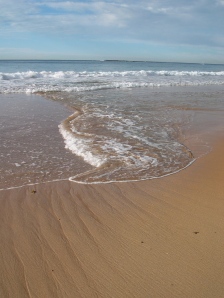 Across the turquoise water, not far from us, the headland was blackened, a sign of recent bush fires. Pitching our tent we located our bikinis and towels in record time, and ran laughing to the sand where we stretched out in the luxury of warm sun. But our sighs of relief were short lived. A mere twenty minutes later our eyes snapped open to an unholy screeching and a caboooom on our left.
Across the turquoise water, not far from us, the headland was blackened, a sign of recent bush fires. Pitching our tent we located our bikinis and towels in record time, and ran laughing to the sand where we stretched out in the luxury of warm sun. But our sighs of relief were short lived. A mere twenty minutes later our eyes snapped open to an unholy screeching and a caboooom on our left.
We jack-knifed upright, as two small aircraft circled the bay. Each time they flew over a distant headland, explosions detonated with a nasty bang, an orange ball of fire and a huge puff of dark brown smoke rising from the land. I looked at Toni.
“Oh my God,” she shouted, suddenly invoking a deity she had hitherto expressed no interest in, “They must be doing target practise.”
My mind attempted to clutch at some sort of reality.
“Well, it’s … it is a navy reserve,” she added.
“Oh my God they’re bombs!”
No wonder the landscape opposite was black. Past bombings had caused a firestorm. We panicked, as the navy jets swerved to our side. The bushy green escarpment leading to clear water just around the curve of our bay exploded a couple of times, just a few hundred metres away, way too close for comfort. Frantic, we ran round in circles on the sand, waving colourful beach towels over our heads in a desperate gesture of surrender, yelling Don’t hit us!
Years later as I was telling this story, a look of frank disbelief crossed the face of my male listener. He left it in no doubt that he thought I was a liar and a fantasist, or that the mushrooms we’d had in Nimbin had addled our brains. But, although the photos in my mind are faded, almost forty years later, they’re still real.
Our beach remained intact. Perhaps navy guys liked an occasional swim there themselves and didn’t want to spoil their own playground. After half an hour of mayhem, they swerved off, having no doubt laughed at our antics on the sand.
By now the wind, water and birdsong we came for had somehow lost their flavour, and we were debating our next move as we lit a cosy campfire. The afternoon faded to dusk.
But once again, serene Honeymoon Bay turned out to be busier than anticipated. The sound of another engine caused a brief moment of panic till we realised it was a battered ute pulling a trailer. Crunching to a slow park twenty metres from our tent two Aboriginal guys jumped out barefoot, in shorts and t-shirts.
“I thought you said this beach was deserted” I grumbled.
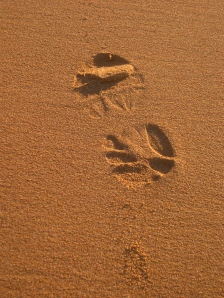 Suddenly aware of our total defencelessness, we greeted them cautiously as they ambled over to our tent to say hi. Sydney is supposedly ghetto free, and yet with no official policy ever being issued on the topic, somehow I’d never met an aborigine. Neither had Toni.
Suddenly aware of our total defencelessness, we greeted them cautiously as they ambled over to our tent to say hi. Sydney is supposedly ghetto free, and yet with no official policy ever being issued on the topic, somehow I’d never met an aborigine. Neither had Toni.
“G’day, we’re Kev – and Gordon,” said the more outgoing one, pointing to himself and his brother. “We’re doin’ a bit of fishin’ tonight. Wanna come with us?”.
“O…K”, we said, tentative about spending the evening with two strange guys in the wilderness, but not wanting to be racially prejudiced.
Assuming casual expressions, we sauntered over to their camp and were reassured by the sight of a big net in the trailer, which they were backing onto the beach.
“What sort of fish do you catch round here?” asked Toni, apparently an expert on everything.
“Oh all sorts, hang round, you’ll see.”
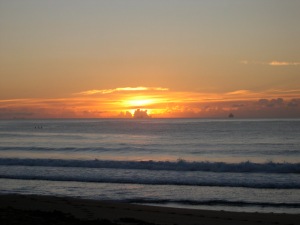 Darkness fell and we detoured to pick up warm tops from our tents as the air began to cool. On our return, ignoring us completely, the brothers heaved the net over the side of the trailer, unfolding it at water’s edge. Kev grabbed one corner, anchoring it while his brother, apparently immune to the cold, backed slowly into the bay in his shorts and t-shirt, pulling his end of the net with him.
Darkness fell and we detoured to pick up warm tops from our tents as the air began to cool. On our return, ignoring us completely, the brothers heaved the net over the side of the trailer, unfolding it at water’s edge. Kev grabbed one corner, anchoring it while his brother, apparently immune to the cold, backed slowly into the bay in his shorts and t-shirt, pulling his end of the net with him.
Seeing our puzzlement, Kev said “Water’s only waist deep here. He’ll pull it right out, then go across the bay and come up the beach over there. We’ll catch quite a bit that way.”
What he didn’t say was that this was probably ancestral land which his forebears had fished the same way, minus the ute, trailer and industrial sized net, for generations. And because he didn’t say it, we didn’t think to ask Hey how do you feel about your beautiful country being bombed to pieces and burnt to a cinder on a regular basis?.
Within half an hour or so, Gordon had crossed to the other side of the beach and he and Kev started to draw in the net.
“Not a bad catch” said Kev, watching the wriggling, heaving mass inside, “but we’ve had bigger.” Muscles straining, they hauled it into the trailer.
“Like some fish for brekkie?” he asked with a smile.
We looked at each other, still not totally at ease. What did they want?
“OK … yeah.”
“Bring over your fryin’ pan”. We did.
“Plenty o’ leather jacket here. They make good eatin’ for brekkie,” he said.
Pulling a leather jacket out, Gordon effortlessly snapped off its head and stripped the skin in one movement. I was stunned to see a fish so cleanly prepared without any utensils, in less than five seconds.
“You see you don’t need all them fancy knives and things,” he said flourishing and dispatching another fish in one gesture, “not for leatherjacket.”
He tossed them one by one into the pan till we said ‘enough’, and it was time for thankyous and goodnight. They hopped into the ute, lit up the headlights and jolted away from our campsite.
There was something about this encounter that left me confused. They were lovely guys. Where were the problems? Without realising it we had been brainwashed by our culture to expect the worst. Our ignorance was profound.
We cared about others and had often jumped up and down about our rights and the rights of various other groups. That awareness was part of living in the sixties and seventies. My sister even had her hair frizzed into an afro. But I scarcely knew anything about the history of Aboriginal people or the issue of Aboriginal rights at that time. The blanket of silence and lies was all pervading. A casual and friendly meeting with Gordon and Kev was my first real inkling that what we saw on TV and the reality of aboriginal people just didn’t match up. They weren’t the hopeless group we’d been brainwashed into believing they were. Maybe that’s what they mean when they talk about cultural genocide. If the Ministry for Truth spreads enough lies, they become the truth. And if you never mention that there was an Aboriginal history of resistance to invasion … well then, it didn’t happen.
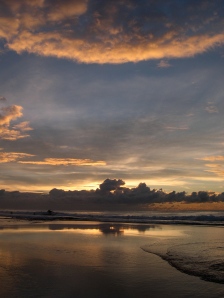 Next morning it was a no-brainer to pack up and head away from possible death and dismemberment at the hands of the navy, but not before we’d enjoyed our tasty fried fish breakfast over the campfire, and taken one more nervous swim.
Next morning it was a no-brainer to pack up and head away from possible death and dismemberment at the hands of the navy, but not before we’d enjoyed our tasty fried fish breakfast over the campfire, and taken one more nervous swim.
“You’ve still got to see Point Perpendicular,” said the indefatigable Toni. “It’s not far from here. It’s amazing. There’s an old lighthouse on this two hundred foot cliff with incredible views around Jervis Bay. We’ll be OK. They won’t bomb us in a car.”
But our tyres kept getting bogged in the sandy track on the way up the hill to the cliff. We had to hop out and wedge dry vegetation under them. I finally got the hang of keeping the car afloat on the treacherous sand as Toni gave directions.
“Keep moving, don’t stop. That’s how you get bogged” she said, her voice rising.
We were concentrating so hard on the sand we barely noticed the suspicious blackness of the terrain around us, the scrub just clusters of crispy charcoal twigs. Suddenly, the ominous sound of aircraft nearby. Surely they wouldn’t drop bombs so close to a historic building … and with a car driving through … with no surrounding foliage our old blue Holden station wagon stood out clearly.
But we hadn’t calculated on the testosterone levels of the fun loving boys at the controls, probably not much older than us, and just as overconfident. They thought we’d make interesting target practice. Not that they intended to hit us. It was more a game of how close can we get and still miss?
Well, the answer was very close. That day’s weapon of choice was a rapid fire gun. We watched, screaming, as blackened bushes jumped and shook alarmingly close to our car. What if they hit us? I slowed down, visualising a bullet passing through the roof of the car, or the petrol tank exploding. Should we jump out and make a run for it?
“Don’t stop, don’t stop” yelled Toni, “we’ll sink into the sand and then we won’t be able to move.”
The Holden plodded loyally on, wheels spinning, up and up the hill, while the plane buzzed around like a mosquito, finally disappearing as we got close to the lighthouse.
I didn’t ask myself when we got there if Point Perpendicular, the azure sky, the wind whipping our hair and the spectacular drop from the old lighthouse to the frothing surf below were worth nearly being strafed for. We were young. It was just part of our day. We bounced back.
But we did ask ourselves: How could the Navy leave an area where they were doing firing practice un-signposted ? Our answer lay at the exit. We had to actually crash the car through bushes to get out because leaving the park at the same place we’d come in on the first day, this time the boom gate was down. Looking behind as we left, I saw a round metal sign nailed to the middle of the boom, painted black with white skull and crossbones. It said Danger No Entrance. Firing Zone … by order of etc ...
Back in the dull safety of suburbia I didn’t fill my parents in on the details of our holiday. I deemed them too sensitive to handle the information.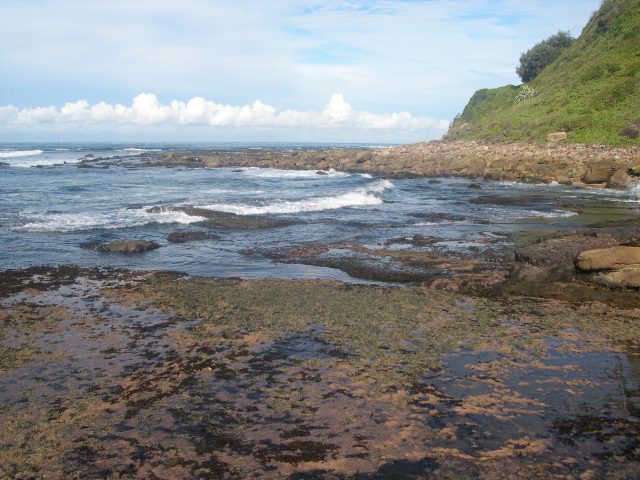

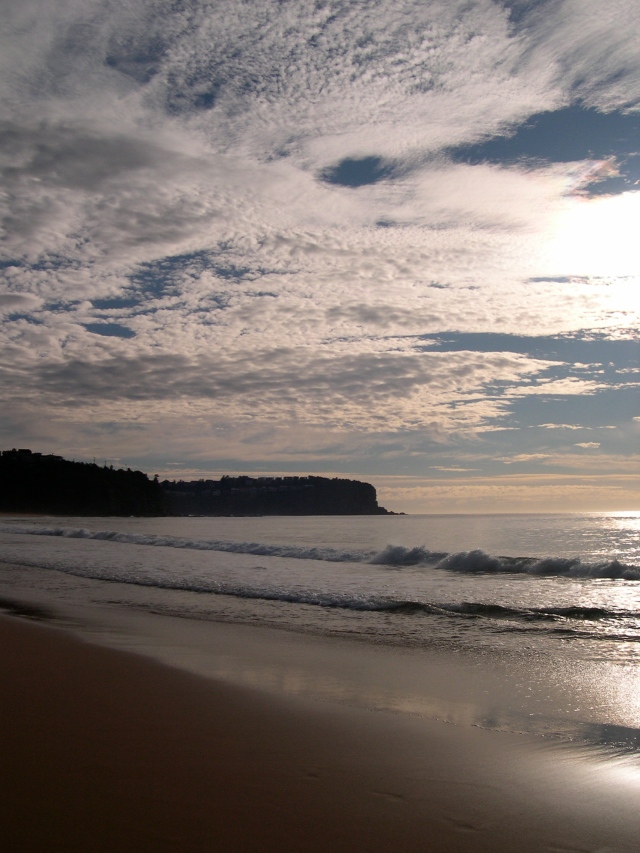
Wouâââhh ! I am so happy i had news, both from “Nimbin” and “the past”.
These summer holidays 2010 are a unique opportunity to be on my own, doing a lot of TV watching. Yesterday it was about German young people who did take the experimentation of living the naturist healthy-food community in Greece : 72 ha on Ithaque Island. The TV showed how it was going on 19 years after. It is : not too bad => Ithaque is still an Island and Mediterranée is a reliable sea.
I enjoyed the winter photos on your blog and my favorite phrase was :
“My parents nodded and managed to stay polite, having spent years listening to my sister Diana’s socialist harangues.”
C’est du vécu ! (French for : the scene did happen for good). It is even more delightful to me, whose parents were none but classy Zombies, and the”haranging peers” show was not standing a shadow of a chance. ♥
Glad you enjoyed it … so you remember Nimbin? They say if you remember the 70s you weren’t there but I’m not sure that’s entirely true …
Excellent story! Gosh the things I don’t know would fill a book (sic). Looking forward to more … xx
Well we haven’t spent that much time together since school really, and even if we do talk at 100 miles an hour there’s only so much you can fit in …
I haven’t been here for awhile and wow it’s changed. A great story as well as your usual wonderful photos. I do remember the 70’s but not in the way you do as I was immersed in my own domestic tragedy so your account of your adventures was illuminating and scary. I like your reflections about cultural genocide- it took me until the 90’s to dispel my ignorance about our first peoples and to have the courage to speak out about it. Thanks for this funny yet inspiring account. No wonder you’ve got blooger’s wrist! Have a great time at your graduation.
you write like Nancy Mitford, v. talented & expressive.
Gosh thanks Anton …
she did those patient family expose pieces; I look forward to more of yrs.
Taa Anton!
😀